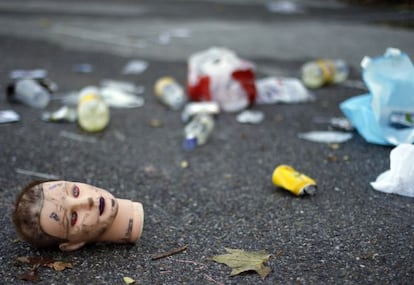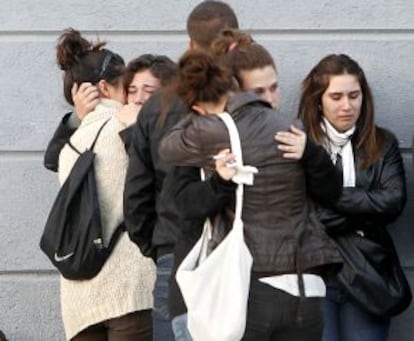A year on from Madrid’s Halloween tragedy, answers remain elusive
The anniversary of the deaths of five young women at a massive party is looming, but the court investigation has made little progress

As the first anniversary approaches of the deaths of five young women, who were crushed as they tried to escape from an overcrowded Halloween party in Madrid, there is no sign that the judicial investigation into the tragedy is close to a conclusion. Bringing prosecutions against those alleged to be responsible may take a further three years.
Eduardo López-Palop, the judge overseeing the case, says that he intends to close the probe by the end of the year, but lawyers representing the victims say this is unlikely. López-Palop himself complained earlier this year that he lacks the resources to deal with the huge amount of paperwork that has been accumulated. So far, nobody has been formally charged with responsibility for the deaths, and the event promoter, Miguel Ángel Flores, has not been taken into custody.
The five young women were killed in the early hours of November 1 when a firecracker set off at a stampede, trapping thousands of revelers inside a narrow passageway in the Madrid Arena venue. It has since been determined that tickets for the party were oversold and that security measures were inadequate for an event of its size. City Hall officials knew as early as October 6 that there was going to be a Halloween party at Madrid Arena. However, nobody alerted the emergency services until a few hours before the event, which was insufficient time to deploy the necessary number of ambulances and health personnel.
On the night of the tragedy, a temporary stage was set up, blocking some of the venue's emergency exit points. The event organizer allegedly sold 17,000 tickets, well in excess of Madrid Arena's official capacity of 10,600. "The event promoter made 458,000 euros from ticket sales alone. Aside from that there were VIP tickets, although we don't know how many of them were sold, and then there are the drinks sales," says José María Siñeriz, who represents the family of Cristina Arce, one of the young women killed that night. It has since emerged that no checks were made on the door to ascertain the age of those entering, but it is known that many minors were present.
The judicial investigation has revealed negligence at the highest levels of City Hall regarding security arrangements. An estimated 4,500 young people, many of them underage, held a huge open-air party in the parking lots around Madrid Arena. Inside, the organizers failed to cordon off access to the main dance floor from the upper areas.
"What is still unclear is just what exactly the security staff wearing yellow jackets
The five young women were killed when a firecracker set off a stampede
[employed by a company called Kontrol 34] were doing and where they were deployed. Some say that they were there simply to check tickets at the entrances, but that doesn't add up with so many people and the supposed security requirements inside," says a well-placed police source.
Kontrol 34 has put the blame for the accident at the door of another security company, Seguriber, and the municipal police, who were stationed at the entrance of the arena. The company's lawyer stated that Diviertt — the company owned by Miguel Ángel Flores that organized the event — contacted the firm to ask if it could provide them with a list of registered doormen "so it could directly hire people to cover the event." Diviertt claims that Kontrol 34 was responsible for security at the party.
There were at least five incidents before the human avalanche that crushed and suffocated Rocío Oña, Katia Esteban, Cristina Arce, Belén Langdon and María Teresa Alonso at 3.33am. From 2.30am onward, it had become clear that the venue was overcrowded. "What does this mean? Does it mean that whoever was monitoring the CCTV had no idea what was going on? Didn't any of the security staff on the ground realize? Or were they all looking the other way?" asks a City Hall official who is under investigation in the case.
Meanwhile, the revelers outside had heard that DJ Steve Aoki was about to begin his set and began trying to enter the venue. Francisco del Amo, the coordinator of operations and projects at Madridec, the municipal company responsible for managing Madrid Arena, allegedly gave the order to open one of the delivery entrances, through which around 2,500 people poured. They ran head on into hundreds of others who were trying to escape the crush on the dance floor.
In April, lawyers for the five victims gave López-Palop a video that was first released by newspaper El Mundo reportedly showing Flores opening the doors of the already crowded venue to allow more people to flock inside.
Regardless of who opened the doors, in the ensuing chaos, some of the partygoers ended up buried under up to five layers of bodies, where they lay for several minutes until they could be rescued. The autopsies on the five young women revealed that they all died from suffocation. "The fact that women have a smaller stature, and usually have smaller thoraxes, meant they were unable to move under the human avalanche that engulfed them, with the tragic consequences that resulted," says one of the pathologists who undertook the postmortems. To make matters worse, there were no medical teams on the site. The 72-year-old founder of Madrid's SAMUR paramedic service, Simón Viñals, was at the scene all evening. He is not authorized to practice medicine, according to the Madrid College of Physicians. He was accompanied by his son, Carlos Viñals, and Cecilio Page, who is aged 81. Their first words when they were confronted with the tragic events were: "All night dealing with drunks, and now this." Siñeriz accuses the three of failing to provide assistance: "We'll see if they can also be charged with homicide, as several others will be."

The duty judge that night was Eduardo López-Palop, who oversaw the removal of the bodies of 18-year-olds Katia Esteban and Cristina Arce. Rocío Oña, also aged 18, died at 5.45am at Madrid's Clínico hospital. The other two victims, María Teresa Alonso, aged 20, and Belén Langdon, aged 17, were taken to two other hospitals.
In the ensuing investigation, 24 people have been targeted as suspects. The organizer of the event, Miguel Ángel Flores, has not been held in prison, despite repeated requests by the lawyers representing the victims' families, who say that he is a flight risk, given that he has businesses in Ecuador and Panama. He was briefly held on December 27, but was released the next day after posting bail of 200,000 euros.
The lawyers also asked Judge López to listen to recordings released by EL PAÍS of a conversation between the police chief on duty at the time, Cándida Jiménez, and the operator at the emergency switchboard that illustrate the delays and confusion of that night.
Sources close to the investigation have told EL PAÍS that Flores has been "keeping a low profile" until the investigation is complete. "He is building his defense by blaming City Hall for providing him with premises that did not meet the minimum requirements to hold an event of this nature; but always with the maximum respect for the victims," say the same sources. But City Hall sources argue that a number of events had been previously held at Madrid Arena without any problems.
The judicial investigation has also revealed the close relationship between Flores and Madridec. In the wake of the incident, Madrid Mayor Ana Botella sacked the head of the entity. Councilor Pedro Calvo, whose job was to oversee Madridec, and Deputy Mayor Miguel Ángel Villanueva, also lost their jobs. City Hall closed all municipally owned venues after the deaths in order to carry out a thorough security check, causing the cancelation of a number of events.
Madrid Arena reopened on April 24 to host a construction materials trade fair. Visitors were given a leaflet with detailed instructions in the event of a fire or any other emergency that would require immediate evacuation of the premises.
Negligence at the highest levels of City Hall has been revealed
Opposition parties in Madrid demanded a commission be set up to establish the extent of responsibility within the Popular Party-controlled city administration for the tragedy. The commission made 14 recommendations, among them the need for prior inspection of any municipally owned venue by the police, computer-controlled checks on the number of people entering large-scale events, and the setting up of a special office to deal with similar emergencies in the future, placing emergency services under a single supervisory body, as well as ensuring that there is always an appropriate police presence at venues where large numbers of people are in attendance.
Sources at City Hall say that all the recommendations have already been adopted. The mayor will face a plenary session this Thursday to answer questions on improved security arrangements at municipally owned venues.
Over the course of the last 12 months, 42 witnesses have been called, along with a further 43 people who suffered injuries at Madrid Arena on November 1. So far, the families of the five dead girls have brought charges jointly. It is possible that as the investigation approaches its conclusion they will take different approaches. At least three of them have suggested that they may bring charges against all 24 of those targeted, while others are saying that they will focus on around a dozen.
Gerardo Viada, the lawyer representing the family of Katia Esteban, says that eight of the accused will face the majority of charges: Miguel Ángel Flores, three senior members of Madridec's management team, a director of Seguriber, the firm tasked with overall security for the event, Simón and Carlos Viñals, and Carlos Manzanares, the head of Kontrol 34, the sub-contracted security firm. This approach would leave out the former head of security at City Hall, Antonio de Guindos, along with three senior police officials, among them Chief Inspector Emilio Monteagudo, and the head of Madrid's SAMUR, Alfonso del Álamo. Then there is the matter of agreeing on the definition of the deaths. Some of the families say those accused are guilty of intentional homicide, which in Spain is punishable by up to 15 years in prison. Others say the deaths were the result of involuntary manslaughter, which carries a maximum four-year jail term.
In the former case, the accused would appear before the Madrid Provincial Court, and the case would be heard by three judges; in the latter, they would be up before a single judge in the High Court. "The investigation has been slow because of the large number of people involved, and the judge has allowed all our requests to go through. There is still a long way to go before he reaches any conclusions," says Gerardo Viada, the lawyer representing the family of Katia Esteban, who says that it is most likely that involuntary manslaughter charges will be brought against those deemed responsible for the tragedy. López-Palop, the judge overseeing the case, still has to hear testimony from five more witnesses, while there are still several expert witness reports to be taken into account.
Several legal experts consulted by EL PAÍS estimate that a sentence will take another three years to be reached, bearing in mind the likely appeals by the accused. Further delays can be expected, given that the state prosecutor who began the case had a baby this summer. The lawyer standing in for her will require time to get up to speed on this long and complex case.
This Thursday, to commemorate the anniversary of the tragedy, the mother of Cristina Arce is planning on holding a vigil at Madrid Arena, beginning at 11pm, to draw attention to the delays in reaching a verdict. She has asked those attending to bring a flower and a candle. City Hall says that it plans to hold a small event in remembrance of the five young women who died. There have also been proposals that have received cross-party support to rename Madrid Arena Cinco Estrellas (Five Stars).
Tu suscripción se está usando en otro dispositivo
¿Quieres añadir otro usuario a tu suscripción?
Si continúas leyendo en este dispositivo, no se podrá leer en el otro.
FlechaTu suscripción se está usando en otro dispositivo y solo puedes acceder a EL PAÍS desde un dispositivo a la vez.
Si quieres compartir tu cuenta, cambia tu suscripción a la modalidad Premium, así podrás añadir otro usuario. Cada uno accederá con su propia cuenta de email, lo que os permitirá personalizar vuestra experiencia en EL PAÍS.
¿Tienes una suscripción de empresa? Accede aquí para contratar más cuentas.
En el caso de no saber quién está usando tu cuenta, te recomendamos cambiar tu contraseña aquí.
Si decides continuar compartiendo tu cuenta, este mensaje se mostrará en tu dispositivo y en el de la otra persona que está usando tu cuenta de forma indefinida, afectando a tu experiencia de lectura. Puedes consultar aquí los términos y condiciones de la suscripción digital.









































